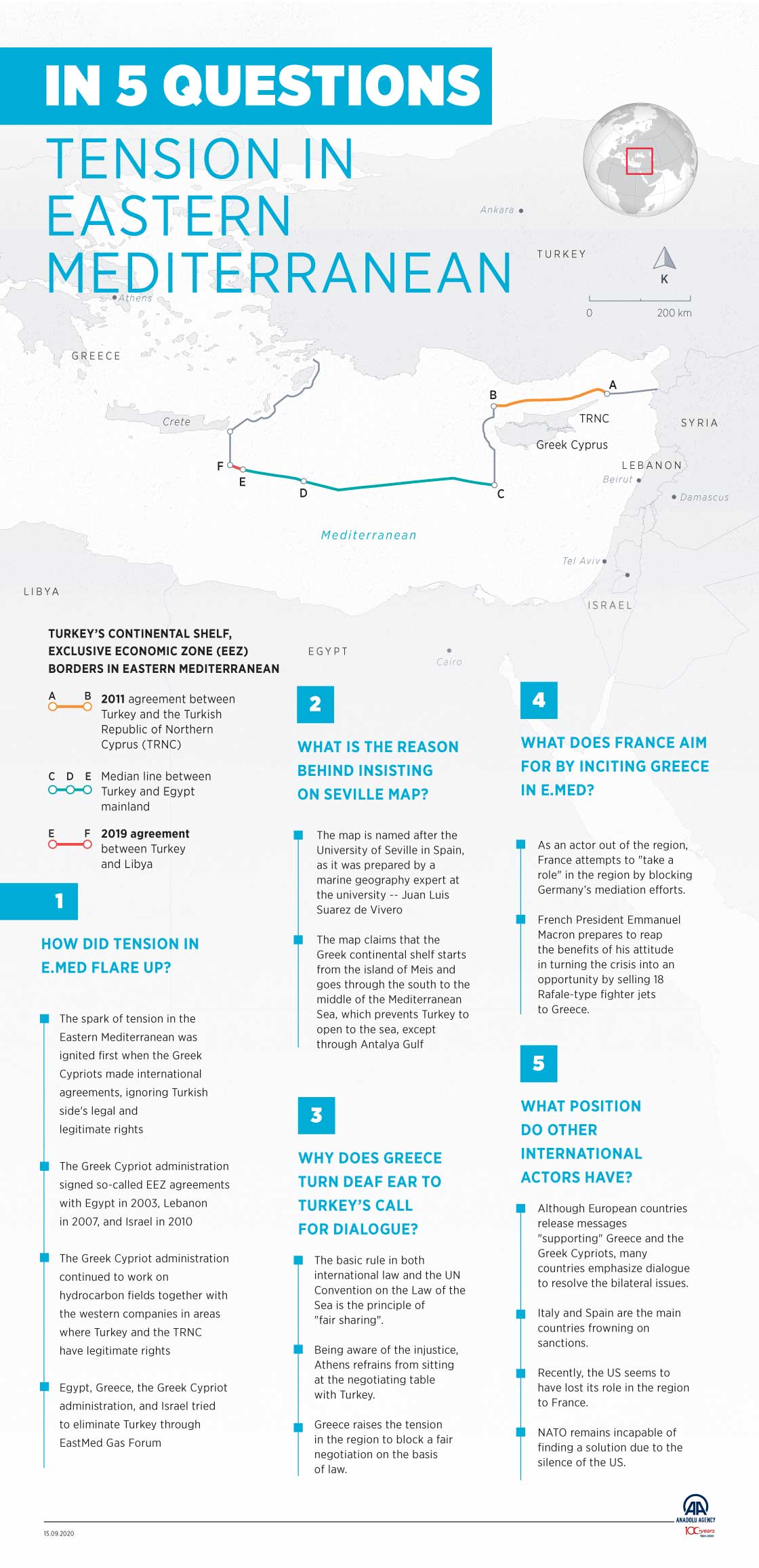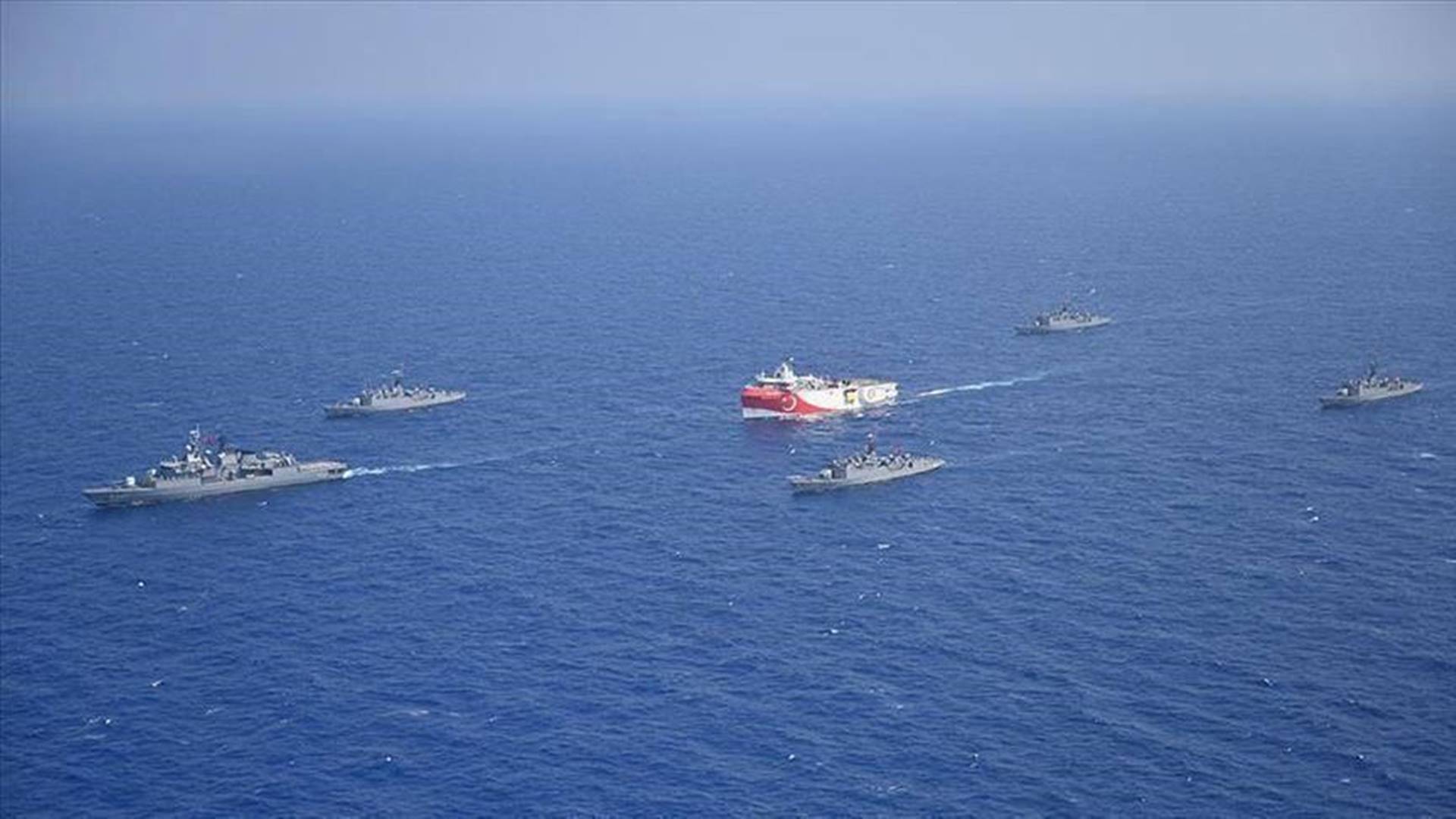ATHENS: Despite Turkey’s repeated calls for dialogue towards a fair solution, Greece continues to take steps to drive up the tension
Provoked by actors from outside the region such as France, Greece is taking steps to ramp up tension instead of establishing a direct dialogue with Ankara.
Below Anadolu Agency lays out the reasons behind the rising tension in the Eastern Mediterranean as well as the attitudes of Greece and France in the region.

1. How did the tension in the Eastern Mediterranean flare-up?
The tension in the Eastern Mediterranean was first ignited when the Greek Cypriots made international agreements to explore energy resources around the island, ignoring the legitimate rights of the Turkish side in the island’s north.
Western companies, with the support of their governments, embarked on a wide range of natural gas exploration and drilling in the region with support from the Greek side.
For years Turkey and the Turkish Republic of Northern Cyprus (TRNC) have been warning the parties that the natural resources around the island should be offered to the benefit of all people, and a fair and lasting solution is needed. But they turned a deaf ear to Turkey’s warnings.
As more hydrocarbon fields were explored in the Eastern Mediterranean, the countries in the region moved to make Exclusive Economic Zone (EEZ) agreements.
Turkey and TRNC kept warning Greek Cypriots as they signed so-called EEZ agreements with Egypt in 2003, Lebanon in 2007, and Israel in 2010.
The Greek Cypriot administration continued to work on hydrocarbon fields together with Western companies in the areas where Turkey and TRNC have legitimate rights.
Egypt, Greece, the Greek Cypriot administration, and Israel tried to eliminate other actors in the region, such as Turkey, Libya, and Lebanon, through the East Med Gas Forum in Cairo.
Turkey’s Oruç Reis pauses East Med mission as tension’s focal point moves to France
As a goodwill initiative, Turkey and TRNC proposed through the UN to establish a joint committee on hydrocarbon resources.
However, Athens and the Greek Cypriot administration, which received the support of the European Union, showed that they were not open to cooperation.
2. Why is Greece insisting on using the Seville map?
The Seville map is used by Greece and the Greek Cypriots to isolate Turkey by trying to confine it to its Mediterranean coast.
Erdoğan to highlight Turkey’s determination, Greek violations in East Med in UN speech
The map, prepared by Professor Juan Luis Suarez de Vivero of the University of Seville in southern Spain, suggests that the boundaries that Greece claims in the Aegean and Mediterranean seas as its continental shelf and the EEZ declared by the Greek Cypriots in 2004 indicates the official borders of the EU.
This map claims that the Greek continental shelf starts from the island of Meis and goes south to the middle of the Mediterranean Sea, which gives Turkey no territory outside of the Gulf of Antalya, southern Turkey.
Turkey rejects these claims, calling them irrational and inconsistent with international law.
Ankara rejects this claim of a 40,000-square-kilometer continental shelf projected from a 10-square-km island lying just 2 km from the Turkish shore while being 580 km from the Greek mainland.
Video: ‘Seeking justice at core of Turkey’s E.Med activities’
3. Why is Greece turning a deaf ear to Turkey’s call for dialogue?
In international law, the principle of “distance” is not mentioned as a rule for delimitating continental shelves and EEZs.
The basic rule in both international law and the UN Convention on the Law of the Sea is the principle of “fair sharing.”
According to this, islands have smaller continental shelves or EEZ areas than the mainland.
Many factors are taken into account at this point, such as the size of the islands, location, and how far they are from the mainland.
Aware of this injustice, the Greek side avoids sitting at the negotiating table with Turkey, demanding as a precondition that Turkey stop drilling activities before establishing a dialogue.
Turkey previously withdrew its Oruc Reis vessel temporarily as a sign of good will and to show it was ready for dialogue.
But then Greece signed a maritime deal with Egypt despite Germany’s diplomatic efforts to start negotiations between Turkey and Greece.
Greece further exacerbated tension by holding joint military exercises with France and the United Arab Emirates south of the island of Crete.
4. What is France after?
French President Emmanuel Macron says he has adopted a “red-line policy” in the region backing Greece against Turkey over energy exploration.
By provoking Athens and encouraging Greece to increase its military spending, Macron is preparing to reap the first fruits of his attitude with France’s sale of 18 Rafale-type warplanes to this country.
5. What are the positions of other international actors?
EU countries have yet to set a common policy in the region.
Although European countries issue messages supporting Greece and the Greek Cypriots for the sake of “EU solidarity,” many countries emphasize the importance of dialogue to solve the crisis.
Greece and the Greek Cypriot administration insist on sanctions against Turkey, but Italy and Spain disagree.
Meanwhile, US President Donald Trump frequently calls for diplomacy but has little else to say due to domestic problems ahead of the November presidential election.
But it’s noteworthy that Washington recently partially lifted a decades-long arms embargo on Southern Cyprus.
On the other hand, Athens is not in favor of talks in NATO but it tries to persuade the EU to put sanctions on Turkey, which makes it difficult to find a solution through the bloc.
AA / Balkantimes.press
Napomena o autorskim pravima: Dozvoljeno preuzimanje sadržaja isključivo uz navođenje linka prema stranici našeg portala sa koje je sadržaj preuzet. Stavovi izraženi u ovom tekstu autorovi su i ne odražavaju nužno uredničku politiku The Balkantimes Press.
Copyright Notice: It is allowed to download the content only by providing a link to the page of our portal from which the content was downloaded. The views expressed in this text are those of the authors and do not necessarily reflect the editorial policies of The Balkantimes Press.

